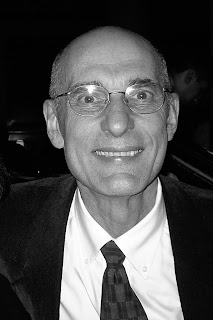
I got an email yesterday from a friend. He asked me what I thought about Charles Simic. He's a poet that some of you might have heard of. He was the poet laureate of the US a couple of years ago. I think my friend was asking me about him because he figured that Charles Simic and I shared some history. We both came to the US after the war as Displaced Persons, refugees.
My friend's question got me thinking. I wonder how old Simic was when he came here to America, Chicago. I think he was older than I was--he was born before the war and he probably remembers a lot of it. I was born in 1948 and remember only the DP camps and what I heard my parents and their friends talking about. In one of the official biographies, it says Simic's life was "complicated by the events of World War II." I like the way that makes the war sound like something no more important than static on your radio, a couple hours without internet.
I doubt he ever read my poems, but I've read a lot of his.
His poems to me feel European, existential, surreal, funny in a really dark way. Maybe it's because of the different ways we learned our English. I learned it from the ground up starting when I came over when I was three. Coming to the states when he was in his teens, he probablly learned his English from the middle up (and down), and so the words he knows are the words for little plain things and big ideas, frightening and foreign even though they are a lot of times our own.
Here's a poem Charles Simic wrote.
Puppet-Maker
In his fear of solitude, he made us.
Fearing eternity, he gave us time.
I hear his white cane thumping
Up and down the hall.
I expect neighbors to complain, but no.
The little girl who sobbed
When her daddy crawled into her bed
Is quiet now.
It's quarter to two.
On this street of darkened pawnshops,
Welfare hotels and tenements,
One or two ragged puppets are awake.
____
Here's a poem I wrote called "A Dog Will." It recently was published in The Convergence Review.
A Dog Will
A dog will
eat a dog
and a dog will
eat a man
and a man will
eat a dog
and a man will
eat a man
and a man will eat
his own father
sister and brother
even the mother
who fed him
milk at her breast
even though
every rule
of his church
and his people
tells him not to
if he is hungry
-----------
If you want to see a youtube of Charlie Simic reading at Cornell, just click
here.
If you want to see a youtube of me reading at St. Francis College in Brooklyn, NYC, just click
here.




